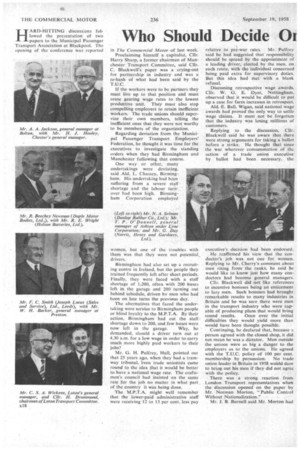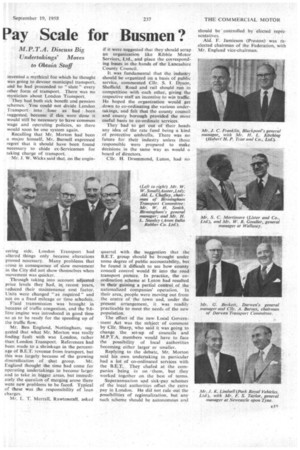Who Should Decide Of Pay Scale for Busmen?
Page 108

Page 109

If you've noticed an error in this article please click here to report it so we can fix it.
M.P.T.A. Discuss Big Undertakings' Moves to Obtain Staff
in The Commercial Motor -of last week.
Proclaiming himself a capitalist, alr. Harry Sharp, a former chairman of Manchester Transport Committee, said air. C. Blackwell's paper was a crying-out for partnership in industry and was a re-hash of what had been said by the T.U.C.
If the workers were to be partners they must live up to that position and must cease gearing wage rates to the lowest produttive unit. They must also stop compelling employers to retain inefficient workers. The trade unions should supervise their own members, telling the inefficient ones that they were not worthy to be members of the organization.
Regarding deviation from the Municipal Passenger Transport Employers' Federation, he thought it was time for the executives to investigate the standing orders when they had Birmingham and Manchester following that course.
One way or other, many undertakings were deviating, said Ald. L. Chassey, Birmingham. His undertaking had been suffering from a severe staff shortage and the labour turnover had been high. Birmingham Corporation emploVed women, but one of the troubles with. them was that they were not .potential_ drivers. Birmingham had also set up a recruiting centre in Ireland, but the people they trained frequently left after short periods. Finally, they were faced with a staff shortage of 1200,, often with 200 buses left in the garage and 200 turning out behind schedule, driven by men who had been on late turns the previous day.
The alternatives that faced the undertaking were service to Birmingham people or blind loyalty to the M.P.T.A. By their action, Birmingham had cut the staff shortage down to 200, and few buses were now left in the garage. Why, be demanded, should a driver turn out at 4.30 a.m. for a low wage in order to carry much more highly paid workers to their jobs?
Mr. G. H. Pulfrey, Hull, pointed out that 25 years ago, when they had a tramway tribunal, -even trade unionists came round to the idea that it would be better to have a national wage rate. The craftsmen's council had insisted on the same rate for the job no matter in what part of the country it was being done.
The M.P.T.A. might well remember that the lower-paid administrative staff were receiving 12 to 13 per cent, less pay relative to pre-war rates. Mr. Palfrey
said be had suggested that responsibility should be spread by the appointment of a leading driver, elected by the men, on each route, with the individual concerned being paid extra for supervisory duties. But this idea had met with a blank refusal.
Discussing retrospective wage awards, Cllr. W. G. E. Dyer, Nottingham, observed that it would. be difficult to put up a Case for fares increases in retrospect.
Aid. E. Ball, Wigan, said national wage awards had proved the only way to settle wage claims. It must not be forgotten that the industry was losing millions of customers.
Replying to the discussion, alr. Blackwell said he was aware that there Were strong arguments for taking a ballot before a strike. He thought that since the war wherever consummation of the action of a trade union executive by ballot had been necessary, the executive's decision had been endorsed.
He reaffirmed his view that the conductor's job was not one for women. Replying to Mr. Cherry's comment about men rising from the rank, he said he would like to know just how many conductors had become general managers.
alr. Blackwell did not like references to incentive bonuses being an enticement to lazy men. Such bonuses had brought remarkable results to Many industries in Britain and he was sure there were men in the transport industry who were capable of producing plans that would bring sound results. Once over the initial difficulties they would yield more than would have been thought possible.
Continuing, he declared that, because a person agreed with the closed shop, it did not mean he was a dictator. Men outside the unions were as big a danger to the employers as to. the unions. He agreed with the T.U.C. policy of 100 per cent. membership by persuasion. No trade union leader in Britain in 1958.woUld dare to bring out his men if they did not agree with the policy.
There was a strong reaction from London Transport. representatives when the discussion . opened on the paper by Mr. Norman Morton, " Public Control Without Nationalization."
Mr. I. B. Burnell said Mr. Morton had invented a mythical foe which he thought was going to devour municipal transport, and he had proceeded to "slate" every other form of transport. There was no mysticism about London Transport.
They had both sick benefit and pension schemes. You could not divide London Transport into four as had been suggested. because if this were done it would still be necessary to have common wage and operating policies, so there would soon be one system again.
Recalling that Mr. Morton had been a major himself, Mr. Burnell expressed regret that it should have been found necessary to chide ex-Servicemen for taking charge of transport.
Mr. J. W. Wicks said that, on the engin eering side, London Transport had altered things only because alterations proved necessary. Many problems that arose in consequence of slow movement in the City did not show themselves when movement was quicker.
Through taking into account adjusted price levels they had, in, recent years, reduced their maintenance cost factor. Units were changed "as required" and not on a fixed mileage or time schedule.
Fluid .transmission was brought in because of traffic congestion, and the 9,6litre engine was introduced in good time so as to be ready for the speeding up of the traffic flow.
Mr. Ben England, Nottingham, suggested that what Mr. Morton was really finding fault with was London., rather than London Transport. References had been made to a shrinkage in the percentage of B.E.T. revenue from transport, but this was largely because of the growing diversification of that group. Mr. England thought the time had come for operating undertakings to become larger and to take in bigger areas, but immediately the question of merging arose there were new problems to be faced. Typical of these was the responsibility of loan charges.
Mr. L. T. Merrall, Rawtenstall, asked if it were suggested that they should scrap an organization like Ribble Motor Services, Ltd., and place the corresponding buses in the hands of the Lancashire County Council.
It was fundamental that the industry should be organized on a basis of public service, commented Gk. S. I. Dyson, Sheffield. Road and rail should run in competition with each other, giving the respective staff an incentive to win traffic. He hoped the organization would get down to co-ordinating the various undertakings, and felt that the county council and county borough provided the most useful basis to co-ordinate services.
They had to get out of their heads any idea of the rate fund being a kind of protective umbrella. There was no future for their industry unless those responsible were prepared to make decisions in the same way as would a board of directors.
Cllr. H. Drummond, .Luton, had no quarrel with the suggestion that the B.E.T. group should be brought under some degree of public accountability, but he found it difficult to see how county council control would fit into the road transport picture. In practice, the coordination scheme at Luton had resulted in their gaining a partial control of the nationalized companies' operation. In their area, people were moving out from the centre of the town and, under the present arrangement, it was readily practicable to meet the needs of the new population.
The effect of the new Local Government Act was the subject of comment by Cllr. Sharp, who said it was going to change the set-up of councils and M.P.T.A. members would have to face the possibility of local authorities becoming either larger or smaller.
Replying to the debate, Mr. Morton said his own undertaking in particular had a lot of co-ordinated services with the B.E.T. They chafed at the companies being in on -them, but they worked together on the best of terms.
Superannuation a,nd sick-pay schemes of the local authorities offset the extra pay in London. I4e did not rule out the Possibilities of regionalization, but any such "scheme should be autonomous and
should be -controlled by elected repre. sentatives.
Aid. F. Jamieson (Preston) was reelected chairman of the Federation, with Mr. England vice-chairman.
















































































































































































































